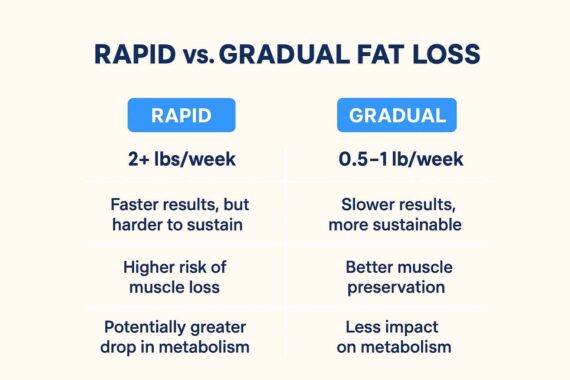Ever looked in the mirror and thought, “Okay, I need to lose this belly-yesterday!”? You’re not alone. Many of us want fast results, especially before vacations, weddings, or just to feel more confident in our clothes.
But here’s the catch: rapid fat loss isn’t about starving yourself or running endless miles. It’s about understanding your body, using smart strategies, and moving at a pace that actually works.
In this guide, we’ll break down what rapid fat loss really is, how your body responds, and the science-backed ways to get results safely.
An Overview of Rapid Fat Loss

What Rapid Fat Loss Actually Means
When people say “rapid fat loss,” they usually mean they want to lose fat, not just water or muscle. But your body doesn’t always make that distinction.
Most experts recommend losing 1–2 pounds (0.5–1 kg) per week (MedlinePlus). Rapid fat loss pushes beyond that—think 2+ pounds per week—but it requires caution.
| Type of Loss | Typical Weekly Change | Focus |
|---|---|---|
| Traditional Fat Loss | 0.5–1 kg | Steady fat loss, muscle preservation |
| Rapid Fat Loss | >1 kg | Faster results, careful monitoring |
So yes, you can speed things up—but there are trade-offs.
The Science of Fat Loss
How does fat actually leave your body? Spoiler: it’s not disappearing into thin air. Your body burns stored energy (fat) when you maintain a calorie deficit. That means you burn more than you eat.
Hormones like insulin, cortisol, and leptin regulate fat storage and release. If you cut calories too fast, your metabolism may slow down to conserve energy.
A study found that rapid weight loss led to a bigger drop in resting metabolic rate compared to gradual loss (Cambridge University Press).
On the bright side, fast fat loss can reduce visceral fat—the dangerous fat around your organs—faster than slower methods (Endocrine Journal).
| Benefit | Risk |
|---|---|
| Quick motivation boost | Possible muscle loss |
| Faster reduction in visceral fat | Metabolism may slow temporarily |
| Visible changes early | Harder to maintain long-term |
My Honest Take
Rapid fat loss isn’t evil-it just needs smart planning. Crash diets and extreme approaches might show results on the scale but usually come with lost energy, irritability, and rebound weight gain.
Think of it like driving a sports car on a twisty road. You can go fast—but only if you stay in control. Strength training, protein intake, sleep, and proper nutrition are your brakes, steering, and fuel.
You may like : How to Use MCT Oil for Weight Loss (Top 10 Ways)
Creating a Smart Calorie Deficit

What Exactly Is a Calorie Deficit?
A calorie deficit simply means you burn more calories than you consume. Easy enough in theory, right? But in practice, it’s a balancing act: cut too little and you won’t see results; cut too much and your body goes into “famine mode.”
Here’s a quick rule of thumb:
- Mild deficit: ~250–500 calories/day → slower but sustainable fat loss
- Moderate deficit: ~500–750 calories/day → faster results, manageable energy
- Aggressive deficit: >750 calories/day → rapid results but higher risk of muscle loss
Balancing Fat Loss With Muscle Preservation
Your metabolism relies on muscle mass. If you lose too much muscle during rapid fat loss, your body burns fewer calories at rest. To protect your muscles:
- Eat 1.2–2.2g of protein per kg of body weight daily.
- Include strength training 2–4x per week.
- Don’t skip healthy fats—they support hormones that burn fat.
Why Not Starve Yourself?
Starvation might give quick numbers on the scale, but it:
- Lowers energy, focus, and mood
- Causes muscle loss
- Slows metabolism
- Leads to binge eating later
Instead, think smart calorie reduction + nutrient-rich foods. Your body prefers fuel that lasts, not quick fixes.
The Science Behind Rapid Fat Loss
How Your Body Burns Fat
When in a calorie deficit, your body taps into fat stores for energy. This involves:
- Lipolysis – fat cells release fatty acids into the bloodstream.
- Oxidation – these fatty acids are converted into energy for your muscles and organs.
Your hormones regulate the process:
- Insulin: Too high → fat storage; controlled levels → fat burning
- Cortisol: Stress hormone; too much → fat retention, especially in the belly
- Leptin: Signals fullness; low levels → harder to stick to a calorie deficit
Rapid Fat Loss Effects
A meta – analysis revealed that rapid fat loss reduces body fat faster initially, but also slightly lowers metabolic rate compared to gradual loss (PMC Article).
The key takeaway? Rapid fat loss works best when combined with:
- Strength training
- High protein intake
- Adequate sleep
- Controlled stress
Fat Loss Methods Comparison Table
| Method | Rate of Fat Loss | Muscle Preservation | Sustainability |
|---|---|---|---|
| Gradual Deficit | 0.5–1 kg/week | High | Very high |
| Rapid Deficit | 1+ kg/week | Moderate | Moderate |
| Extreme Fasting/Crash | 2–5 kg/week | Low | Low |
FAQs About Rapid Fat Loss
Can I lose 5 pounds in a week safely?
Possibly, if your starting body fat is higher. But much of that may be water, not fat. True fat loss is slower.
Will my metabolism slow down if I lose fat fast?
Some slowdown can occur, but strength training and protein help offset it.
How do I protect my muscles?
Lift weights, eat protein, and don’t cut calories too aggressively.
Is rapid fat loss sustainable long-term?
Not usually. It’s a jumpstart, not a permanent lifestyle. Transition to a sustainable plan after initial results.
How fast can I see real fat loss results?
Expect 1-2 pounds per week of actual fat loss. Initial bigger drops are often water weight.
Thoughts: Rapid Fat Loss is a Gimmick
Rapid fat loss isn’t a gimmick—it’s a strategy. Done right, it gives fast results without destroying your body. The secret? Balance, smart calorie management, strength training, and sleep. Crash diets may thrill the scale, but they rarely thrill your future self.
So, instead of chasing a quick fat loss fix, think of rapid fat loss as a guided sprint-fast, yes, but controlled, strategic, and sustainable. Your body will thank you, and your confidence will soar along with those early results.











Leave a Reply